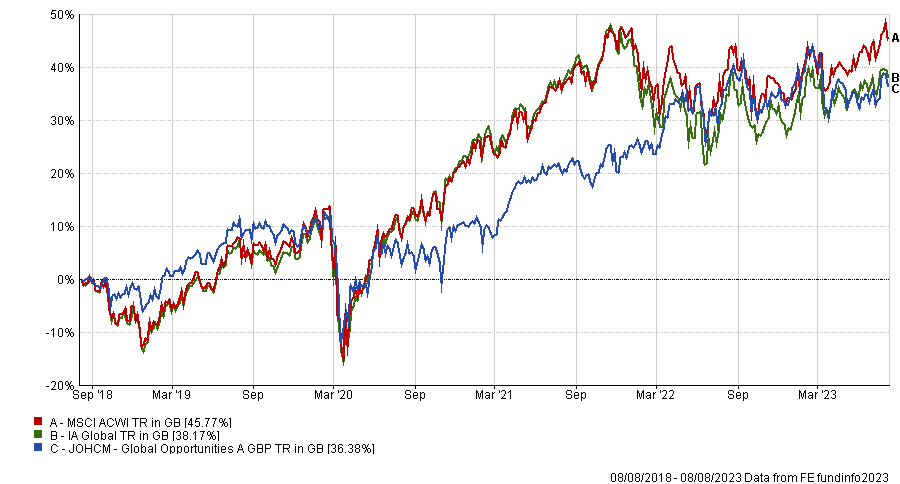Investors keep hearing that diversification is key, but true diversification is often hard to achieve. This isn’t helped by the fact that sometimes a fund’s underlying holdings don’t always match with what investors might expect.
Some of this might be due to what Robert Lancastle, FE fundinfo Alpha Manager of the £549.8m JOHCM Global Opportunities fund, calls “the tyranny of the benchmark”, a force that pushes everyone to invest in the same things over and over again. A recent example of this could be the exponential rise in artificial intelligence (AI), said the manager.
“There are real reasons for AI to be an interesting growth area, but it has been driving the behaviours and the ownerships of single stocks in all sorts of places you'd have never expected,” he said.
“We're willing to be different, rather than having someone tapping on our shoulder to act and behave like every other ox in the herd. When you've had five years (or longer) of this sort of pressure, there are a lot of people that will yield to it just to manage career risk, frankly.”
One such place where people might be surprised to find AI and technology stocks are S&P500 value exchange-traded funds (ETFs). Lancastle argued that diversifying into a value ETF that's benchmarked against the S&P 500 isn't diversifying at all.
As an example, he picked the $26bn iShares S&P 500 Value ETF, which has 17.6% of tech exposure.
“The tyranny of the benchmark means that even stocks such as Amazon, Microsoft or Meta not only are all appearing but are also the biggest three names in this value ETF, making up well over 10% of its portfolio,” he said.
“Not only do investors get exposure to tech through areas they'd expect to, but also many areas they don't expect to. By sifting through the detail, which no one does until the aftermath of these things, you realise that even your value fund or deep-value fund probably has got some of these names in them. The tyranny of the benchmark forces you to behave like everyone else because if you aren't, you're out of the job, fundamentally.”
Performance of fund vs sector and index over 5yrs
Source: FE Analytics
Lancastle’s co-manager Ben Leyland noted investors who are seeking non-technology, quality-biased funds don't have much choice because of this dynamic.
That is not to say all technology is bad. Indeed, the managers themselves owned the likes of Oracle and SAP in the fund for a long time “because they have business models we like, with sticking customers, good pricing power and great cash generation,” Leyland said.
Microsoft and Adobe are also positions they added to at the beginning of the year, although tech remains a significant underweight for the fund, with a 6.3% exposure versus 21.9% of the benchmark.
One tech-related sector that is becoming more interesting is the advertising agencies space, with the Japanese advertising and public relations company Dentsu being a stand-out stock here, they said.
“Dentsu is a name we’ve been buying recently. It’s in a sector that has been on the wrong side of digitisation for arguably the past 10 years, and certain companies in that sector, including Dentsu, have made enough of the right type of investments to get themselves on the right side of new trends, which may or may not include AI going forward,” Leyland concluded.





